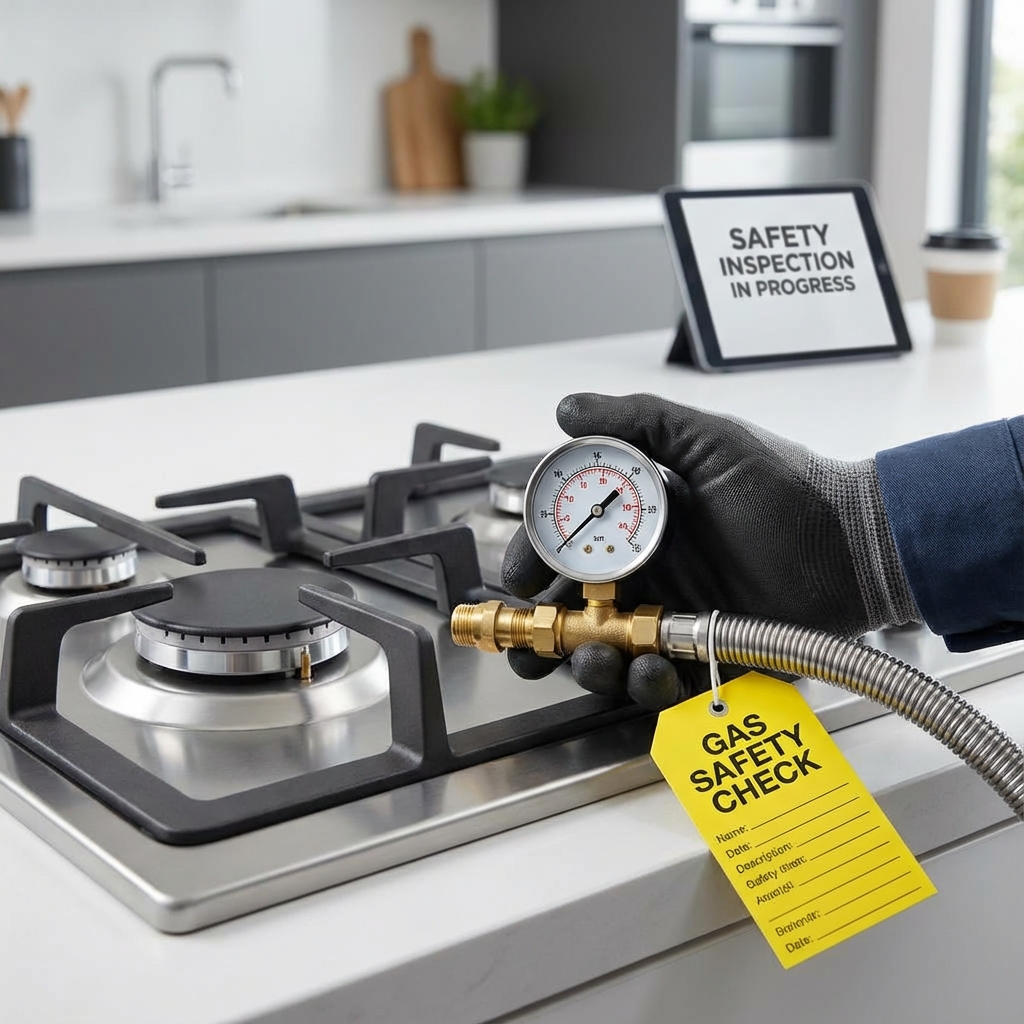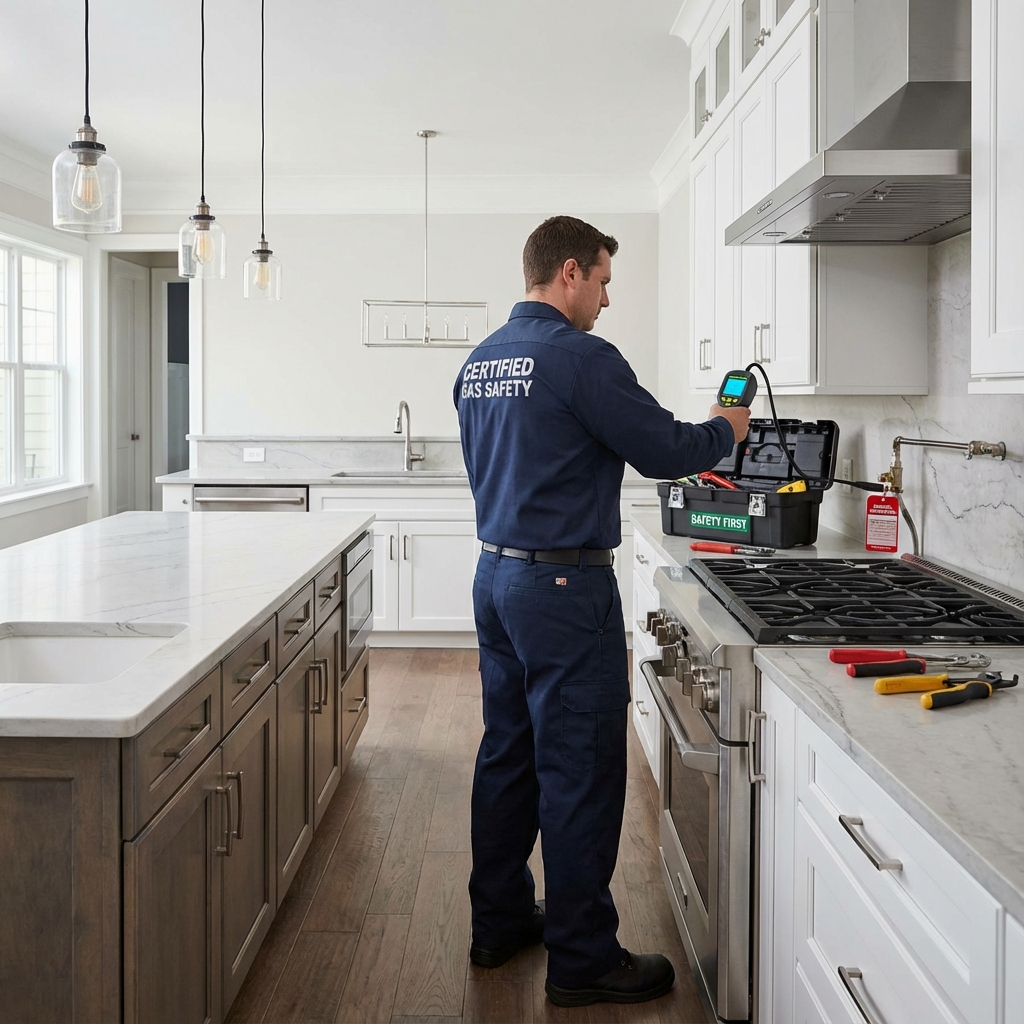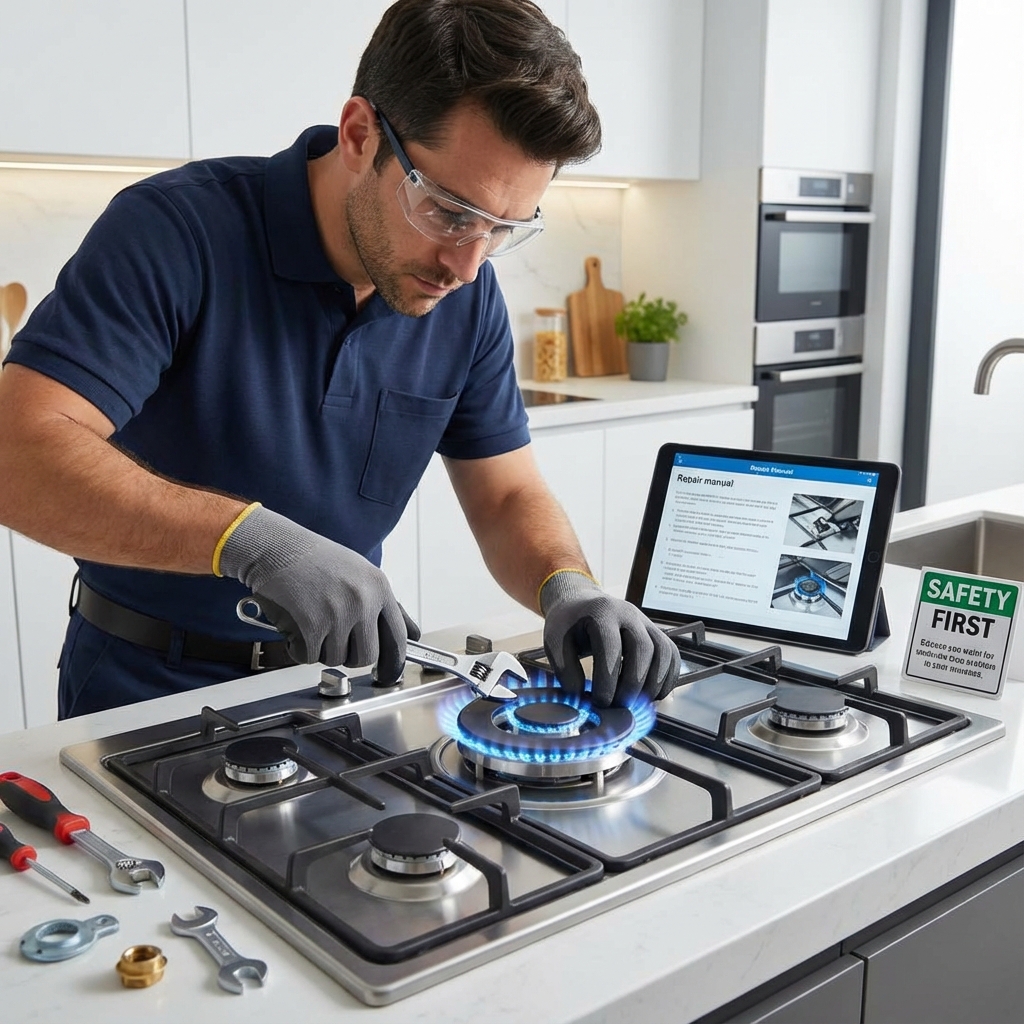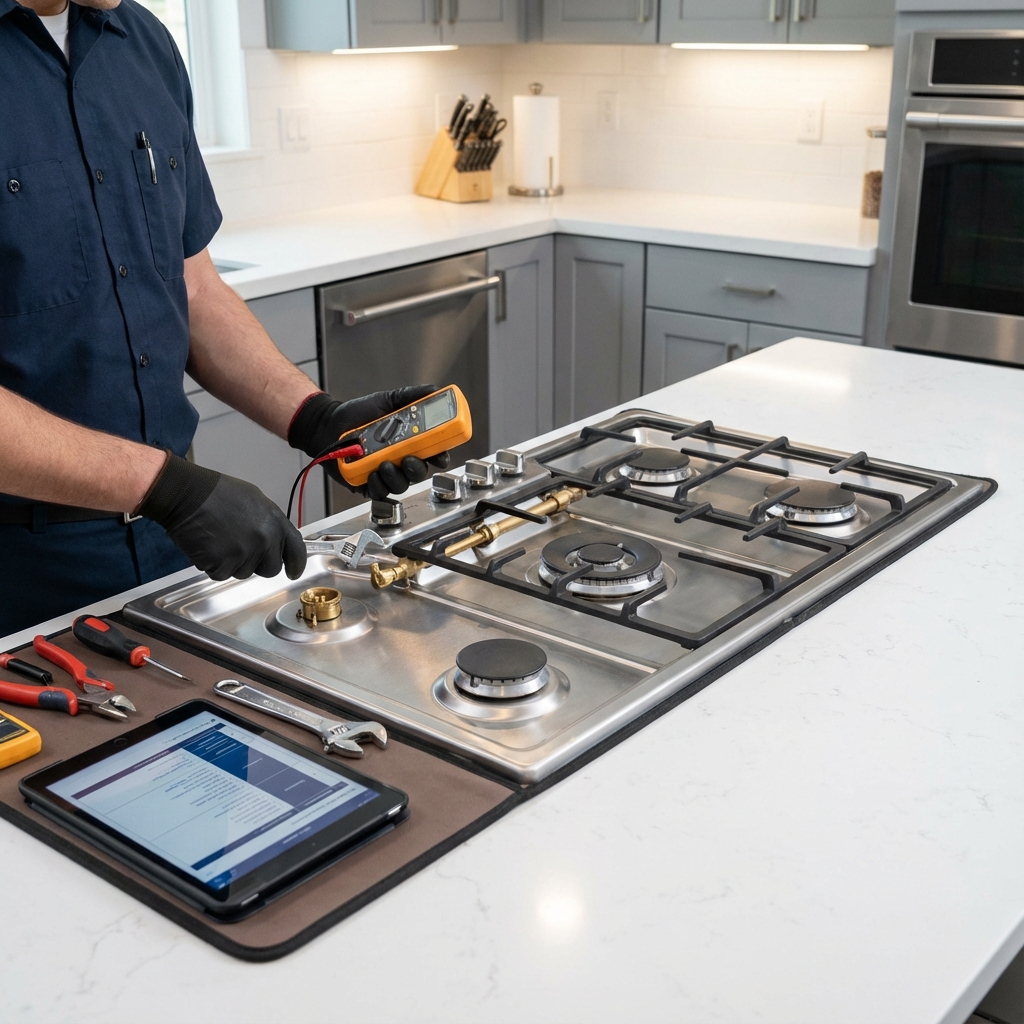Gas Smell from Stove? Gas Leak Detection & Repair Toronto
Detecting a gas smell from your stove is a serious safety concern that requires immediate attention. Gas leaks can pose significant risks including fire, explosion, and health hazards. This comprehensive guide covers everything you need to know about identifying, responding to, and preventing gas leaks from your stove.
Quick Answer: Smelling gas from your stove? Don't ignore gas leaks! Expert gas stove leak detection and repair in Toronto. Emergency service available from JK Appliances for your safety. This is a common issue that can usually be resolved with proper troubleshooting. If the problem persists, professional diagnosis is recommended.
Understanding Gas Leaks
TYPES OF GAS LEAKS
External leaks: Connections, fittings, supply lines Internal leaks: Valves, regulators, internal components Combustion leaks: Incomplete burning, ventilation issues Appliance leaks: Burner assemblies, control valves
NATURAL GAS VS. PROPANE
Natural gas: Lighter than air, rises and disperses Propane: Heavier than air, settles in low areas Detection: Both have added odorant (mercaptan) for smell Safety considerations: Different accumulation patterns affect safety response
LEAK SEVERITY LEVELS
Minor leaks: Small amounts, easily detected and contained Moderate leaks: Noticeable smell, requires prompt attention Major leaks: Strong odor, immediate evacuation necessary Emergency leaks: Visible gas, hissing sounds, extreme danger
Immediate Safety Response
IF YOU SMELL GAS
IMMEDIATE ACTIONS (DO)
- Turn off all burner controls immediately
- Don't use electrical switches, phones, or create sparks
- Open windows and doors for ventilation
- Evacuate the area if smell is strong
- Call gas company emergency line from outside
CRITICAL DON'TS
- Don't light matches, lighters, or candles
- Don't use electrical appliances or switches
- Don't smoke or create any ignition sources
- Don't try to locate leak with flame
- Don't ignore even faint gas odors
EMERGENCY EVACUATION
When to evacuate:
- Strong gas odor throughout kitchen
- Hissing sound from gas lines
- Visible gas cloud or vapor
- Multiple people detect gas smell
Evacuation procedure:
- Leave immediately - don't gather belongings
- Don't use elevators in multi-story buildings
- Go to safe distance from building
- Call 911 and gas company from safe location
- Don't re-enter until cleared by professionals
Common Causes of Gas Smells
CONNECTION PROBLEMS
Loose fittings: Supply line connections, appliance connections Worn seals: Gaskets, O-rings, threaded connections Corrosion: Metal fittings, pipes, connectors Installation issues: Improper connections, wrong fittings
BURNER ASSEMBLY ISSUES
Valve problems: Internal leaks, worn valve seats Control knob issues: Damaged stems, poor sealing Burner head problems: Cracks, poor fit, damage Gas orifice issues: Wear, damage, improper size
SUPPLY LINE PROBLEMS
Flexible connectors: Wear, kinks, damage from movement Rigid piping: Corrosion, joint failures, damage Shutoff valves: Internal leaks, worn components Pressure regulators: Malfunction, wear, adjustment issues
COMBUSTION PROBLEMS
Incomplete burning: Yellow flames, sooting, poor air mixture Ventilation issues: Blocked vents, poor airflow Burner problems: Clogged ports, damaged components Air shutter adjustment: Incorrect air-to-gas ratio
Gas Leak Detection Methods
SENSORY DETECTION
Smell test: Most reliable for small leaks Sound detection: Hissing indicates significant leaks Visual signs: Dead vegetation, dust blowing, bubbling Physical symptoms: Headaches, dizziness, nausea
SOAP SOLUTION TEST
Preparation: Mix dish soap with water (1:1 ratio) Application: Brush or spray on suspected leak areas Observation: Bubbles indicate gas escaping Safety: Safe method for accessible connections Limitations: Only works on external, accessible areas
ELECTRONIC GAS DETECTORS
Combustible gas detectors: Detect various gas types Natural gas specific: Calibrated for methane Propane detectors: Designed for heavier-than-air gases Professional equipment: More sensitive and accurate
PROFESSIONAL DETECTION
Specialized equipment: Electronic sniffers, pressure testing Comprehensive testing: All connections and components Pressure testing: System integrity verification Documentation: Detailed leak location and severity
DIY Safety Checks
VISUAL INSPECTION
Connection points: Look for corrosion, damage, looseness Flexible connectors: Check for kinks, wear, age Burner assemblies: Inspect for cracks, proper fit Control valves: Check operation, sealing
SOAP TEST PROCEDURE
- Turn off all burners and ensure area is ventilated
- Mix soap solution in spray bottle
- Apply to all visible connections
- Look for bubble formation
- Mark any leak locations for professional repair
OPERATIONAL TESTING
Burner flame check: Blue flames indicate proper combustion Control valve test: Smooth operation, complete shutoff Ignition test: Proper lighting without gas buildup Ventilation check: Adequate airflow around appliance
SAFETY EQUIPMENT CHECK
Gas detectors: Test battery and function Ventilation fans: Ensure proper operation Fire extinguisher: Check pressure and accessibility Emergency contacts: Gas company, fire department numbers
Professional Leak Repair
WHEN TO CALL PROFESSIONALS
Immediate Professional Service
- Any detected gas leak
- Strong gas odors
- Hissing sounds from gas lines
- Multiple leak locations
- Internal appliance leaks
Complex Repairs
- Supply line modifications
- Pressure regulator issues
- Multiple component failures
- Code compliance requirements
PROFESSIONAL REPAIR PROCESS
- Emergency response for immediate safety
- Comprehensive leak detection and testing
- System isolation and pressure testing
- Component repair or replacement
- Final testing and safety verification
REPAIR METHODS
Connection tightening: Proper torque specifications Seal replacement: New gaskets, O-rings, thread sealant Component replacement: Valves, fittings, connectors System upgrades: Modern safety features, improved materials
Gas Safety Systems
AUTOMATIC SHUTOFF VALVES
Function: Stop gas flow when appliance is off Types: Thermal, electrical, mechanical Benefits: Prevent gas accumulation, improve safety Installation: Professional installation required
GAS LEAK DETECTORS
Residential detectors: Battery or hardwired units Placement: Near gas appliances, low areas for propane Features: Audible alarms, digital displays, smart connectivity Maintenance: Regular testing, battery replacement
VENTILATION SYSTEMS
Natural ventilation: Windows, doors, vents Mechanical ventilation: Exhaust fans, range hoods Requirements: Adequate air changes per hour Maintenance: Clean filters, check fan operation
EMERGENCY SHUTOFFS
Appliance shutoffs: Individual appliance controls Main shutoffs: Building gas supply control Location: Accessible, clearly marked Operation: Know how to operate in emergency
Prevention Strategies
REGULAR MAINTENANCE
Annual inspections: Professional safety checks Connection checks: Periodic tightening and inspection Component replacement: Proactive part replacement Cleaning: Keep burner areas clean and clear
PROPER USAGE
Gentle operation: Don't force controls or connections Appropriate cookware: Proper size and type Ventilation: Always use during cooking Supervision: Never leave gas appliances unattended
ENVIRONMENTAL PROTECTION
Moisture control: Prevent corrosion from humidity Temperature stability: Avoid extreme temperature changes Physical protection: Prevent damage from impacts Pest control: Prevent damage from rodents
UPGRADE CONSIDERATIONS
Modern safety features: Automatic shutoffs, leak detection Improved materials: Corrosion-resistant components Code compliance: Meet current safety standards Energy efficiency: Newer models with better efficiency
Toronto-Specific Considerations
BUILDING CODES
Ontario Building Code: Current safety requirements Municipal regulations: Toronto-specific gas safety rules Inspection requirements: Mandatory safety inspections Permit requirements: When permits are needed
CLIMATE FACTORS
Winter conditions: Thermal cycling effects on connections Humidity levels: Corrosion prevention considerations Seasonal usage: Increased winter usage patterns Building settling: Effects on gas line connections
SERVICE AVAILABILITY
Emergency services: 24/7 gas emergency response Qualified technicians: Licensed gas fitters in Toronto Parts availability: Local supply of safety components Inspection services: Professional leak detection services
Emergency Contacts
GAS COMPANY EMERGENCY
Enbridge Gas: 1-866-763-5427 (24/7 emergency) Emergency response: Immediate leak investigation Service area: Toronto and surrounding areas Response time: Priority emergency response
FIRE DEPARTMENT
Toronto Fire: 911 for gas emergencies Hazmat response: Specialized gas leak response Evacuation assistance: If required for safety Scene safety: Securing area until safe
PROFESSIONAL SERVICES
JK Appliances: (647) 560-8966 for appliance-related leaks Licensed gas fitters: For supply line issues Building inspectors: For code compliance issues Insurance companies: For damage claims
Cost Considerations
EMERGENCY RESPONSE
Gas company: Usually no charge for emergency response Fire department: No charge for emergency calls Professional diagnosis: $100-200 for leak detection Emergency repairs: Premium rates for urgent service
REPAIR COSTS
Minor connection repairs: $150-300 Component replacement: $200-500 Supply line repairs: $300-800 System upgrades: $500-1500
PREVENTION COSTS
Annual inspections: $100-200 Gas detectors: $50-200 per unit Maintenance supplies: $25-50 per year Safety equipment: $100-300 initial investment
Legal and Insurance Considerations
LIABILITY ISSUES
Property damage: Gas leaks can cause significant damage Personal injury: Health and safety risks Negligence claims: Failure to address known leaks Insurance coverage: Policy requirements and exclusions
REPORTING REQUIREMENTS
Gas company notification: Required for all leaks Building authorities: May require notification Insurance companies: Prompt notification for claims Documentation: Keep records of all repairs and inspections
FAQ
Q: What should I do if I smell gas from my stove? A: Turn off all controls, don't use electrical switches, ventilate the area, and call the gas company emergency line immediately.
Q: Is a faint gas smell normal when lighting burners? A: A very brief, faint smell during lighting can be normal, but persistent or strong odors indicate a problem requiring attention.
Q: How often should I check for gas leaks? A: Perform basic visual checks monthly and have professional inspections annually, or immediately if you suspect any problems.
Q: Can I fix a gas leak myself? A: Never attempt to repair gas leaks yourself. Always call qualified professionals for any gas-related repairs.
Q: What causes gas leaks in stoves? A: Common causes include loose connections, worn seals, damaged components, and improper installation or maintenance.
Gas safety is not negotiable! If you detect any gas smell from your stove, contact JK Appliances immediately for professional leak detection and repair. Our certified technicians provide emergency gas safety services throughout Toronto. Call (647) 560-8966 for immediate assistance - your safety is our priority!
Common Questions People Ask
Q: Is it normal for my gas smell stove to have issues? No, this is not normal behavior and indicates an underlying issue that should be addressed promptly to prevent further damage.
Q: Can I fix this gas smell stove problem myself? Some basic issues can be resolved with DIY troubleshooting, but complex problems require professional diagnosis to avoid safety risks and warranty issues.
Q: How much does professional gas smell stove repair cost in Toronto? Repair costs typically range from $150-$400 depending on the specific issue and parts needed. Our technicians provide free estimates before any work begins.
Q: How long does gas smell stove repair take? Most repairs are completed within 1-2 hours during a single visit. Some cases may require ordering specialty parts with a follow-up appointment.
Q: Should I repair or replace my gas smell stove? If your gas smell stove is less than 8 years old and repair costs are under 50% of replacement cost, repair is usually the better value. Our technicians can help you make the right decision.
Q: Do you offer same-day gas smell stove repair in Toronto? Yes! We offer same-day and emergency repair services throughout Toronto and the Greater Toronto Area for urgent issues.
Q: What brands of gas smell stove do you repair? We service all major brands including Bosch, Samsung, LG, Whirlpool, KitchenAid, GE, Maytag, Frigidaire, Miele, and more.
Q: Is gas smell stove repair covered by warranty? Many gas smell stove issues are covered under manufacturer warranty. We can help verify your warranty status and handle claim processing.
Expert Tips & Pro Insights
💡 Pro Tip: Regular maintenance can prevent 80% of appliance problems. Follow manufacturer guidelines for cleaning and care.
⚠️ Safety Warning: Always disconnect power before attempting any repairs or inspections. If you smell gas, evacuate immediately and call emergency services.
🔧 Technician Insight: Many issues that seem complex often have simple solutions. Start with basic troubleshooting before assuming the worst.
📞 When to Call a Professional: If you encounter electrical components, gas lines, refrigerant systems, or if basic troubleshooting doesn't resolve the issue, it's time to call an expert.





